Related Research Articles
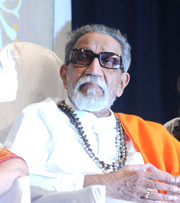
Bal Thackeray, was an Indian politician who founded the Shiv Sena, a right-wing pro-Marathi and Hindu nationalist party active mainly in the state of Maharashtra.
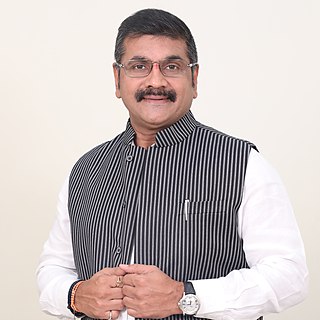
Sachin ahir is an Indian politician from Mumbai, Maharashtra and Deputy Leader of the Shiv Sena. He is current member of Maharashtra Legislative Council. He was Member of the Legislative Assembly from Worli constituency.
Trade Unions in India are registered and file annual returns under the Trade Union Act (1926). Statistics on Trade Unions are collected annually by the Labour Bureau of the Ministry of Labour, Government of India. As per the latest data, released for 2012, there were 16,154 trade unions which had a combined membership of 9.18 million. The Trade Union movement in India is largely divided along political lines and follows a pre-Independence pattern of overlapping interactions between political parties and unions. The net result of this type of system is debated as it has both advantages and disadvantages. According to the data submitted by various trade unions to the Ministry of Labour and Employment as part of a survey, INTUC with a combined membership of 33.3 million, has emerged as the largest trade union in India as of 2013.

The history of Mumbai, can be traced back to 600 BC, when evidences of the first known settlement, Harrappan civilization, here have been discovered.

The All India Trade Union Congress (AITUC) is the oldest trade union federation in India. It is associated with the Communist Party of India. According to provisional statistics from the Ministry of Labour, AITUC had a membership of 14.2 million in 2013. It was founded on 31 October 1920 with Lala Lajpat Rai as its first president.
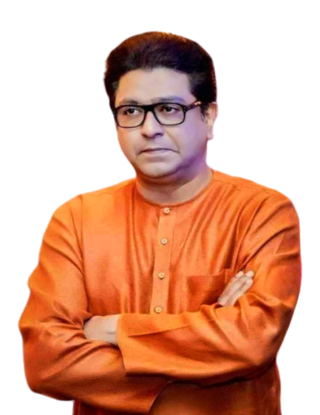
Raj Shrikant Thackeray is an Indian politician and the founding chairperson of Maharashtra Navnirman Sena (MNS), a regional political party. Raj was a former member of Shiv Sena till he founded MNS in 2006. He is the nephew of Balasaheb Thackeray.

Basawon Singh or Basawan Singh also known as Basawon Sinha, was an Indian independence activist and a campaigner for the rights of the underprivileged, industrial labourers and agricultural workers.

Dattatray Samant, also known as Datta Samant, and popularly referred to as Doctorsaheb, was an Indian politician and trade union leader, who is most famous for leading 200–300 thousand textile mill workers in the city of Bombay on a year-long strike in 1982, which triggered the closure of most of the textile mills in the city.
The Rashtriya Mill Mazdoor Sangh is a trade union for textile mills in Mumbai, India.

Jaslok Hospital and Research Centre is a private hospital located in Mumbai was founded by philanthropist Seth Lokoomal Chanrai along with surgeon Shantilal Jamnadas Mehta. The hospital was formally inaugurated on 6 July 1973 by the erstwhile Prime Minister, Indira Gandhi.

The 2008 attacks on Uttar Pradeshi and Bihari migrants in Maharashtra began on 3 February 2008 after violent clashes between workers of two political parties—Maharashtra Navnirman Sena (MNS) and Samajwadi Party (SP)—at Dadar in Mumbai, capital of the Indian state of Maharashtra. The clashes took place when workers of MNS, a splinter faction formed out of the Shiv Sena, tried to attack workers of SP, the regional party based in Uttar Pradesh, who were proceeding to attend a rally organised by the United National Progressive Alliance (UNPA). Defending his party's stand, MNS chief Raj Thackeray explained that the attack was a reaction to the "provocative and unnecessary show of strength" and "uncontrolled political and cultural dadagiri (bullying) of Uttar Pradesh and Bihar migrants and their leaders".

Chitra Mudgal is an Indian Writer and one of the leading literary figures of modern Hindi literature.
Mumbai, also known as Bombay, is the financial capital of India and one of the most populous cities in the world. Mumbai grew into a leading commercial center of India during the 19th century on the basis of textile mills and overseas trade. After independence, the desire to domesticate a Marathi social and linguistic Mumbai to a cosmopolitan framework was strongly expressed in the 1950s. Mumbai, one of the earliest cities in India to be industrialized, emerged as the centre of strong organized labour movement in India, which inspired labour movements across India.

Girangaon was a name of an area now part of central Mumbai, India, which at one time had almost 130 textile mills, with the majority being cotton mills. The mills of Girangaon contributed significantly to the prosperity and growth of Mumbai during the later nineteenth century and for the transformation of Mumbai into a major industrial metropolis. Girangaon covered an area of 600 acres (2.4 km2), not including the workers' housing. The mill workers lived in a community, and they fostered a unique culture which shaped Mumbai at the turn of the twentieth century. This textile industry flourished until the early 2000s after which most of the mills were shut down, as the owners deemed them unprofitable and declared they were incapable of paying their workers' wages.

City of Gold is a 2010 Indian political thriller film. The film was Mahesh Manjrekar's 17th film, having previously directed critically acclaimed films such as Astitva and Viruddh... Family Comes First. It was adapted from Jayant Pawar's Marathi play, Adhantar, with Pawar going on to co-write the film's screenplay. The film explores the life of Mumbai's mill workers after the Mumbai mills shut down in response to the Great Bombay Textile Strike of the early 1980s.

Narayan Meghaji Lokhande (1848–1897) was the father of trade union movement in India. He is remembered not only for ameliorating the working conditions of textile mill-hands in the 19th century but also for his courageous initiatives on caste and communal issues. Apart from this he was also awarded the title of Rao Bahadur in 1895 for his work during riots between Hindus and Muslims. "Justice of peace" was awarded with great respect to him by the then British Indian Government. The Government of India issued a postage stamp with his photograph in 2005.
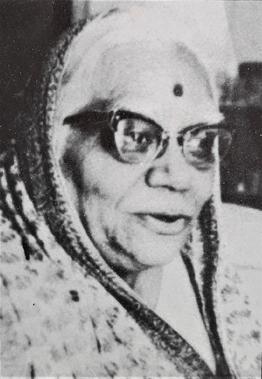
Maniben Kara (1905-1979) was an Indian social worker and trade unionist. She was a founder member of the Hind Mazdoor Sabha and served as its president. She was honoured by the Government of India in 1970 with Padma Shri, the fourth highest Indian civilian award.
Jitendra Satish Awhad is a Indian politician from Maharashtra. He was a Member of the Legislative Assembly of Maharashtra for 3 terms representing Mumbra-Kalwa in Thane. He has previously served as Cabinet Minister of Medical Education and Horticulture in 2014 and Housing and Minority Affairs from 2019 to 2022. He also served as the Guardian Minister of Solapur from 2020. He belongs to the Nationalist Congress Party.
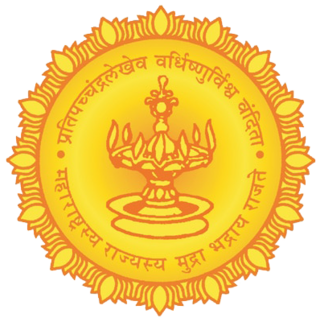
The Ministry of Textiles is a ministry in the Government of Maharashtra. It is responsible for the promotion of the textile industry in Maharashtra.
References
- ↑ "The Great Mumbai Textile Strike... 25 Years On". Rediff.com India Limited. 18 January 2007. Retrieved 20 November 2008.
- ↑ Praveen Swami (14–27 April 2001). "A raw deal and desperation". Frontline . The Hindu. 18 (8). Archived from the original on 31 May 2010. Retrieved 20 November 2008.
{{cite journal}}: CS1 maint: unfit URL (link) - ↑ Anand, Javed (17 January 1997). "In the experience of blue-collared men, he remained the only trade union leader who put workers before politics". Rediff.com .
- ↑ Shiv Kumar (25 March 2005). "Maharashtra may give more mills' land for public use". The Tribune . Retrieved 20 November 2008.
- ↑ P Devarajan (25 March 2000). "India Interior". The Hindu . Archived from the original on 28 September 2008. Retrieved 20 November 2008.
{{cite news}}: CS1 maint: unfit URL (link) - ↑ Bhattacharya, Pramit (19 August 2012). "Untangling the knot between Mumbai and its mills". Livemint. Retrieved 17 January 2020.
- ↑ Amrita Shah (30 October 2008). "Remember Nojh Dharmu". Indian Express Newspapers (Mumbai) Ltd. Retrieved 20 November 2008.
- ↑ "Shree Sankalp Pratishthan". www.shreesankalp.org.
- ↑ "Govinda". Mumbai Mirror.
- ↑ Nisha Tiwari (4 July 2007). "Who's the mill worker?". Bombay Times . The Times of India . Retrieved 20 November 2008.